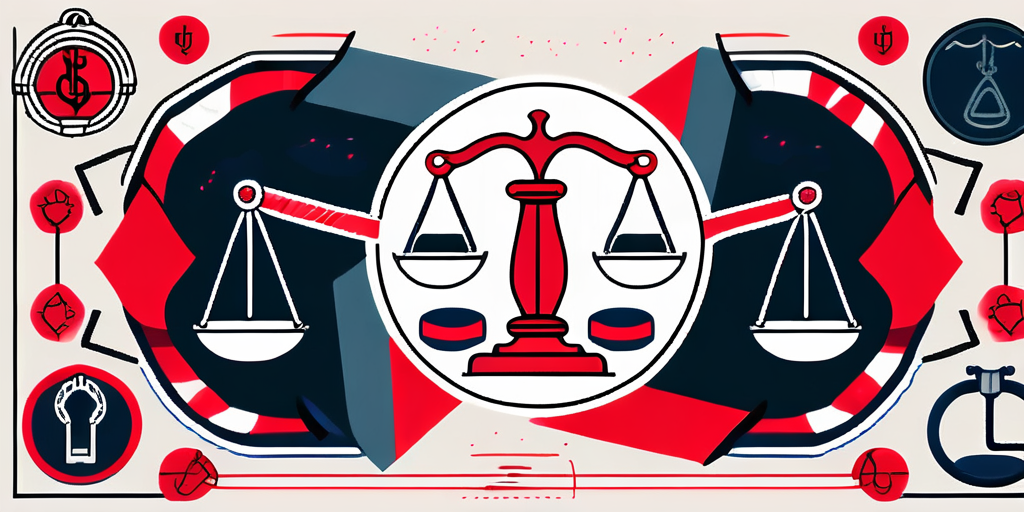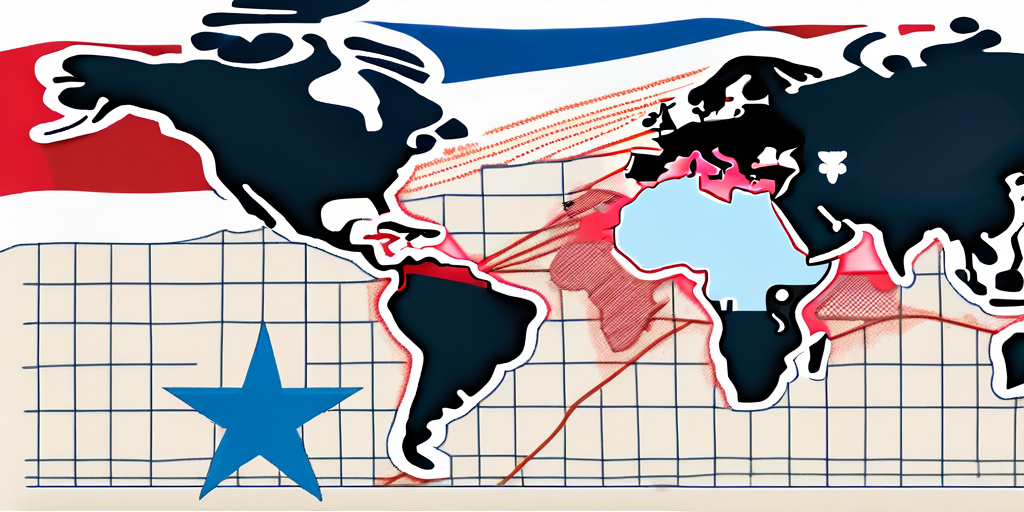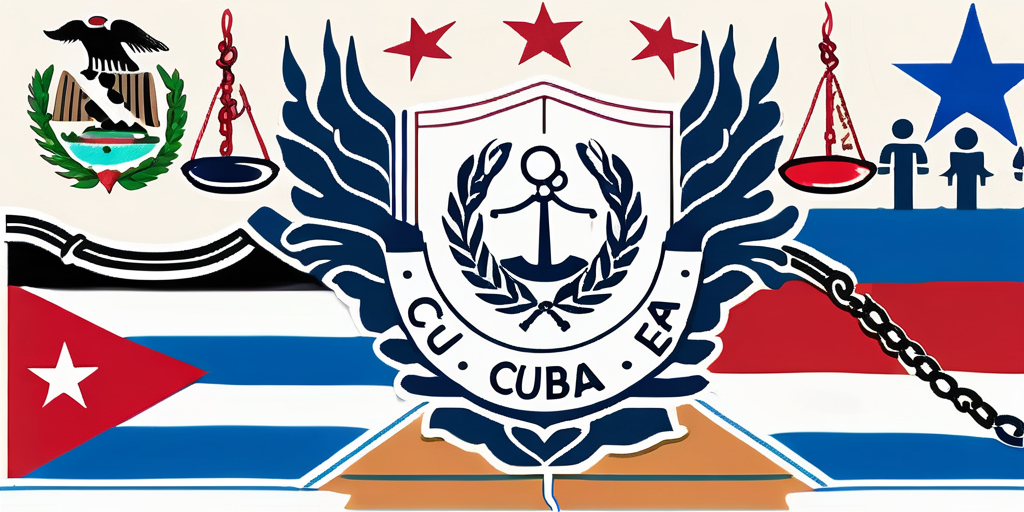Cuba’s interactions with global law enforcement have long been a topic of interest and debate. At the center of this dance lies the phenomenon of Red Notices. In order to understand the intricacies of Cuba’s relationship with global law enforcement, it is crucial to first grasp the concept of Red Notices.
Understanding the Red Notice
Red Notices are international arrest warrants issued by Interpol, the International Criminal Police Organization. They serve as a tool for law enforcement agencies worldwide to seek the location and arrest of individuals wanted for extradition or prosecution. These notices are primarily used for individuals who are considered fugitives or pose a significant threat to public safety.

Definition and Purpose of a Red Notice
A Red Notice is essentially a request to law enforcement agencies worldwide to locate and provisionally arrest an individual, pending extradition. It is important to note that a Red Notice is not an arrest warrant. Rather, it is an alert that provides information about a person’s criminal record and the actions required by member countries in relation to that individual.
The Role of Interpol in Issuing Red Notices
Interpol acts as the intermediary between its member countries, facilitating the exchange of criminal intelligence and cooperation in law enforcement matters. When a member country suspects an individual is outside its jurisdiction and requires assistance from other member countries, it can submit a request to Interpol, which then assesses the situation and decides whether to issue a Red Notice.
Interpol’s decision to issue a Red Notice is based on several factors. The organization carefully evaluates the seriousness of the crime committed, the level of threat posed by the individual, and the availability of evidence to support the request. This thorough assessment ensures that Red Notices are only issued for cases where there is a genuine need for international cooperation in apprehending the wanted person.
Once a Red Notice is issued, it is disseminated to all member countries, who are then responsible for taking appropriate action within their legal frameworks. The notice includes detailed information about the individual, such as their name, nationality, physical description, and any known aliases. It also provides information about the crimes they are wanted for and the requesting country’s extradition requirements.
Member countries receiving a Red Notice are expected to take necessary measures to locate and arrest the individual, either for the purpose of extradition or prosecution. However, it is important to note that the decision to extradite or prosecute lies with the receiving country’s authorities, who will follow their own legal processes to determine the course of action.
Cuba’s Interaction with Global Law Enforcement
Historically, Cuba has had a complex relationship with global law enforcement agencies. The country’s international legal relations have been shaped by various factors, including political ideology, diplomatic relationships, and regional alliances.
Historical Overview of Cuba’s International Legal Relations
Following its revolution in 1959, Cuba’s relationship with the United States and many Western nations became strained. This resulted in the country establishing close ties with other socialist and communist countries. During this period, Cuba’s diplomatic and legal interactions with global law enforcement agencies were often characterized by suspicion and limited cooperation.
One significant event that had a profound impact on Cuba’s international legal relations was the Cuban Missile Crisis in 1962. This tense standoff between the United States and the Soviet Union, with Cuba caught in the middle, highlighted the complexities of Cuba’s position in the global arena. It further strained Cuba’s relationship with the United States and intensified the scrutiny of its interactions with global law enforcement agencies.
Current State of Cuba’s Global Law Enforcement Ties
In recent years, there have been notable shifts in Cuba’s global law enforcement relations. The country has taken steps to improve its diplomatic standing and has engaged in efforts to strengthen international cooperation on law enforcement matters. Cuba has signed various agreements and treaties, demonstrating its willingness to collaborate with global law enforcement agencies and participate in international legal frameworks.
One example of Cuba’s commitment to enhancing its global law enforcement ties is its participation in the United Nations Convention against Transnational Organized Crime. By becoming a party to this convention, Cuba has shown its dedication to combating organized crime and fostering international cooperation in this area. This move has been recognized by the international community and has contributed to a more positive perception of Cuba’s efforts in global law enforcement.
Furthermore, Cuba has also been actively involved in regional initiatives aimed at strengthening law enforcement cooperation in the Caribbean. The country has participated in joint operations with neighboring countries to combat drug trafficking, human smuggling, and other transnational crimes. These collaborative efforts have not only improved Cuba’s relationship with its regional counterparts but have also enhanced its standing in the global law enforcement community.
The Impact of Red Notices on Cuba
The issuance of Red Notices can have significant implications for any country, and Cuba is no exception. The political, social, and economic consequences of these notices warrant careful examination.

Political Implications for Cuba
Red Notices involving Cuban nationals have often been perceived as politically motivated by the Cuban government. Some have argued that these notices are used as a tool by foreign governments to exert pressure on Cuba or as a means to discredit individuals associated with the Cuban regime. The perception of political interference can strain international relations and complicate efforts to foster cooperation between Cuba and other nations.
Social and Economic Consequences
Red Notices can also have social and economic consequences for Cuba. The potential arrest or detention of Cuban individuals can disrupt their involvement in social and economic activities, affecting their families and communities. This disruption can have a broader impact on the country’s social fabric and economic stability.
The Future of Cuba’s Relationship with Global Law Enforcement
As Cuba continues to strengthen its ties with global law enforcement agencies, the future of its relationship remains uncertain. However, there are potential changes on the horizon, which could reshape Cuba’s legal landscape and impact its involvement with Red Notices.

Potential Changes in Cuba’s Legal Landscape
Cuba has been undergoing gradual legal reforms in recent years, aiming to modernize its legal system and align it with international standards. These reforms may include adjustments to extradition procedures, criminal justice practices, and the treatment of individuals subject to Red Notices. Such changes could impact the country’s willingness to cooperate with Red Notice requests and contribute to a more harmonious relationship with global law enforcement agencies.
Predictions for Future Red Notice Involvement
It is hard to predict with certainty the extent of Cuba’s future involvement with Red Notices. Factors such as political dynamics, regional tensions, and the evolving priorities of global law enforcement agencies will all play a role in shaping this involvement. Nevertheless, it is hoped that increased dialogue, transparency, and adherence to legal principles will guide the dance between Cuba and global law enforcement in the years to come.
